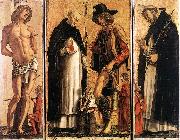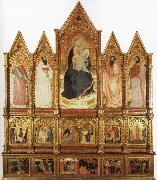Wholesale Oil Painting Reproductions No Minimum and Door to Door! |
|||||||||||
|
|
|||||||||||

|
|||||||||||
|
|
|
||||||||
All ANDREA DA MURANO Oil Paintings |
||||||||
|
|
||||||||
|
|
||||||||
|
Artist Introduction: Italian painter, Venetian school (known 1462-1502)
Italian painter. He is first recorded working as a gilder at S Zaccaria, Venice, in 1463-5. He was one of a number of artists from the island of Murano. Among these he is closest to Bartolomeo Vivarini, whose pupil he may have been. The two collaborated in 1468 on a narrative canvas (destr.) for the Scuola di S Marco, Venice, which probably depicted scenes from the Life of Abraham. The rather harsh sculptural quality of his forms owes much to the influence of Mantegna and Donatello in Padua, and his work has often been associated (and sometimes confused) with that of Andrea del Castagno. He did not, however, ignore the more recent developments of Giovanni Bellini. His triptych depicting SS Vincent Ferrer, Roch, Sebastian and Peter Martyr, with a lunette of the Madonna of Mercy and Four Saints (Venice, Accad.), probably painted in the late 1470s, shows a real concern with light and colour. By the mid-1480s Andrea had settled in Castelfranco on the mainland, chiefly painting altarpieces in the (by then well established) Venetian sacra conversazione form. The altarpiece (1484-1502) in the parish church at Trebaseleghe, nr Padua, is a variation on the form, with Christ embracing the plague saints Sebastian and Roch above and other saints and musicians below, all showing the high degree of expression characteristic of his works. It is one of his finest paintings and also perhaps the most expensive Venetian altarpiece of its day. The altarpiece depicting the Virgin Enthroned with SS Peter, Nicholas of Bari, John the Baptist and Paul (1502; Mussolente, Santuario della Madonna dell' Acqua) is typical of Andrea's work and shows both the strengths and limitations of his art: firm draughtsmanship and expressive qualities combined with a rather conservative composition and somewhat ungainly figures. |
||||||||
|
|
||||||||
|
Polyptych Painting ID:: 4783 |
c. 1475
Tempera on wood, 152 x 88 cm (central panel), 152 x 47 cm (side panels)
Gallerie dell'Accademia, Venice |
|||||||
Height Width |
INS/CM Quality |
|||||||
|
X |
| |||||||
|
|
||||||||
All GIOVANNI DA MILANO Oil Paintings |
||||||||
|
|
||||||||
|
|
||||||||
|
Artist Introduction: Italian Gothic Era Painter, active 1350-1369 |
||||||||
|
|
||||||||
|
|
Polyptych Painting ID:: 33240 |
mk83
1360
Tempera on wood
166x166cm
|
||||||
Height Width |
INS/CM Quality |
|||||||
|
X |
| |||||||
|
|
||||||||
All Pietro Lorenzetti Oil Paintings |
||||||||
|
|
||||||||
|
|
||||||||
|
Artist Introduction: Italian Byzantine Style Painter, ca.1280-1348 |
||||||||
|
|
||||||||
|
|
Polyptych Painting ID:: 33264 |
mk83
c.1320
Tempera on wood
298x309cm
|
||||||
Height Width |
INS/CM Quality |
|||||||
|
X |
| |||||||
|
|
||||||||
|
Prev Next
|
||||||||
|
|
||||||||
|
Related Paintings to Pietro Lorenzetti :. |
||||||||
|
|
||||||||
|
CONTACT US |



